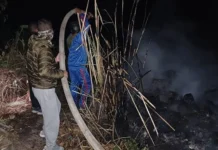ITANAGAR, 27 Sep: The Leil Tara Anyi-Berm Welfare Society (LTABWS) has strongly opposed the granting of bail to the alleged accused in the 2020 murder of Techi Meena Lishi.
LTABWS president Taro Modi said that “it has been almost five years since the cold-blooded murder of our sister, and there has been no justice for Meena but the prime accused Lishi Roni (husband of late Meena) was granted bail by the Supreme Court recently.”
Addressing mediapersons at the Arunachal Press Club on Saturday, Modi appealed to the sessions court to cancel Roni’s bail.
Arunachal Pradesh Women’s Welfare Society (APWWS) president Kani Nada Maling said there has been a series of protests over the heinous crime, and added that the APWWS would extend full support to the bereaved family till justice is delivered.
“This case is one of the rarest cases in Arunachal Pradesh and the word ‘heinous’ also falls short. This case is not a case of an individual family but a general concern for all,” she said.
The sister of late Techi Meena said that initially Roni’s family said it would cooperate with Meena’s family, but it is learnt that a bail plea was filed by Roni’s mother.
“I believe in the judiciary system, and I say that justice should be delivered with the rarest of rare punishment or at least life imprisonment,” she said.
Seven-month pregnant Meena was allegedly murdered by hired goons at the behest of her husband on 5 November, 2020.
The LTABWS, while describing Techi Meena’s case as “delayed justice,” demanded fast-tracking of the trial, cancellation of the bail, and safeguards to prevent criminals from misusing the justice system.
The society expressed dismay that, despite the severity of the case, judicial proceedings have been slow, with only a few witnesses, out of approximately 43, examined so far.
The LTABWS further reminded that Roni is a habitual offender, alleging that at the time of Meena’s murder, he was out on bail in a money laundering case.
It expressed concern that his release poses a serious threat to the judicial process, as he could manipulate witnesses, tamper with evidence, or even attempt to evade trial.



